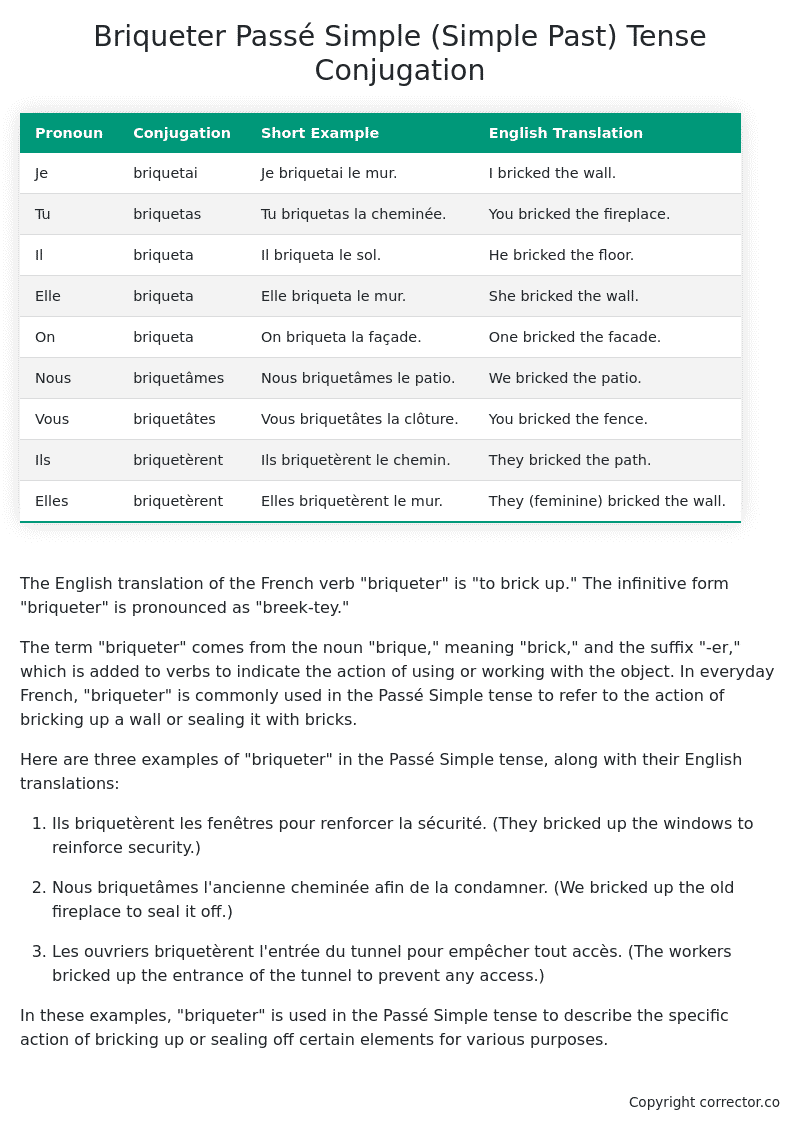Passé Simple (Simple Past) Tense Conjugation of the French Verb briqueter
Introduction to the verb briqueter
The English translation of the French verb “briqueter” is “to brick up.” The infinitive form “briqueter” is pronounced as “breek-tey.”
The term “briqueter” comes from the noun “brique,” meaning “brick,” and the suffix “-er,” which is added to verbs to indicate the action of using or working with the object. In everyday French, “briqueter” is commonly used in the Passé Simple tense to refer to the action of bricking up a wall or sealing it with bricks.
Here are three examples of “briqueter” in the Passé Simple tense, along with their English translations:
-
Ils briquetèrent les fenêtres pour renforcer la sécurité.
(They bricked up the windows to reinforce security.) -
Nous briquetâmes l’ancienne cheminée afin de la condamner.
(We bricked up the old fireplace to seal it off.) -
Les ouvriers briquetèrent l’entrée du tunnel pour empêcher tout accès.
(The workers bricked up the entrance of the tunnel to prevent any access.)
In these examples, “briqueter” is used in the Passé Simple tense to describe the specific action of bricking up or sealing off certain elements for various purposes.
Table of the Passé Simple (Simple Past) Tense Conjugation of briqueter
| Pronoun | Conjugation | Short Example | English Translation |
|---|---|---|---|
| Je | briquetai | Je briquetai le mur. | I bricked the wall. |
| Tu | briquetas | Tu briquetas la cheminée. | You bricked the fireplace. |
| Il | briqueta | Il briqueta le sol. | He bricked the floor. |
| Elle | briqueta | Elle briqueta le mur. | She bricked the wall. |
| On | briqueta | On briqueta la façade. | One bricked the facade. |
| Nous | briquetâmes | Nous briquetâmes le patio. | We bricked the patio. |
| Vous | briquetâtes | Vous briquetâtes la clôture. | You bricked the fence. |
| Ils | briquetèrent | Ils briquetèrent le chemin. | They bricked the path. |
| Elles | briquetèrent | Elles briquetèrent le mur. | They (feminine) bricked the wall. |
Other Conjugations for Briqueter.
Le Present (Present Tense) Conjugation of the French Verb briqueter
Imparfait (Imperfect) Tense Conjugation of the French Verb briqueter
Passé Simple (Simple Past) Tense Conjugation of the French Verb briqueter (You’re reading it right now!)
Passé Composé (Present Perfect) Tense Conjugation of the French Verb briqueter
Futur Simple (Simple Future) Tense Conjugation of the French Verb briqueter
Futur Proche (Near Future) Tense Conjugation of the French Verb briqueter
Plus-que-parfait (Pluperfect) Tense Conjugation of the French Verb briqueter
Passé Antérieur (Past Anterior) Tense Conjugation of the French Verb briqueter
Futur Antérieur (Future Anterior) Tense Conjugation of the French Verb briqueter
Subjonctif Présent (Subjunctive Present) Tense Conjugation of the French Verb briqueter
Subjonctif Passé (Subjunctive Past) Tense Conjugation of the French Verb briqueter
Subjonctif Imparfait (Subjunctive Imperfect) Tense Conjugation of the French Verb briqueter
Subjonctif Plus-que-parfait (Subjunctive Pluperfect) Tense Conjugation of the French Verb briqueter
Conditionnel Présent (Conditional Present) Tense Conjugation of the French Verb briqueter
Conditionnel Passé (Conditional Past) Tense Conjugation of the French Verb briqueter
Conditionnel Passé II (Conditional Past II) Tense Conjugation of the French Verb briqueter
L’impératif Présent (Imperative Present) Tense Conjugation of the French Verb briqueter
L’impératif Passé (Imperative Past) Tense Conjugation of the French Verb briqueter
L’infinitif Présent (Infinitive Present) Tense Conjugation of the French Verb briqueter
L’infinitif Passé (Infinitive Past) Tense Conjugation of the French Verb briqueter
Le Participe Présent (Present Participle) Tense Conjugation of the French Verb briqueter
Le Participe Passé (Past Participle) Tense Conjugation of the French Verb briqueter
Struggling with French verbs or the language in general? Why not use our free French Grammar Checker – no registration required!
Get a FREE Download Study Sheet of this Conjugation 🔥
Simply right click the image below, click “save image” and get your free reference for the briqueter Passé Simple tense conjugation!

Briqueter – About the French Passé Simple (Simple Past) Tense
Formation
Usage
Narration
Historical Context
Interactions with other tenses
Passé Composé
Imparfait
Conditional and Subjunctive
Summary
I hope you enjoyed this article on the verb briqueter. Still in a learning mood? Check out another TOTALLY random French verb conjugation!


